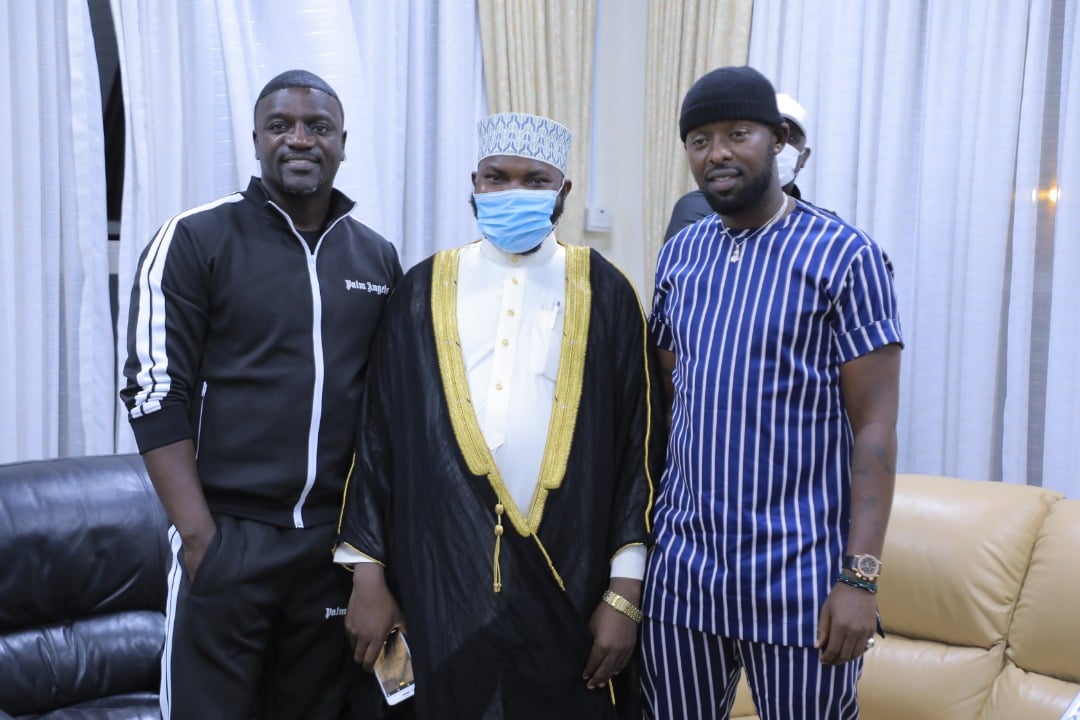Prime
Museveni-Kenzo meet leaves artistes divided

President Museveni (left) and musician Edrisa Musuuza, alias Eddy Kenzo, during the meeting at State House, Entebbe on November 27. Photo/Courtesy of Kenzo’s X Handle
What you need to know:
- The current issues influencing debates in the culture and creative industries dates back to 2020 when The Uganda Comedians Association (TUCA) presented a memorandum to President Museveni addressing concerns within these industries. In response, the President issued various directives in a letter dated March 3, 2021.
Eddy Kenzo’s meeting with President Museveni on Monday, November 27 echoes a historical trend of artistes seeking presidential audiences for industry-related concerns. The outcomes have varied, with some securing tangible support for arts infrastructure, while others allegedly prioritised personal interests.
As news of this meeting circulated, industry insiders questioned the sincerity of Kenzo’s advocacy. His social media post, seemingly highlighting only his faction within the federation, raised concerns about self-centred leadership.
“In the quest for streamlining our industry and lobbying for a well-functioning music industry, today I met my Mzee HE Yoweri Kaguta Museveni and we discussed the urgent need for the amendment of the Copyright and Neighbouring Rights Act 2006. It was a great discussion in which he promised to follow into the matter with the urgency it requires. He also accepted my request for a meeting to introduce to him to the Uganda National Musicians Federation Leadership and how far we have gone as a federation in building national structures for a more inclusive and vibrant music industry,” Kenzo, whose real name is Edrisa Musuuza, wrote on social media.
Many argued that copyright, while crucial, was not the sole challenge facing the arts industry, instead spotlighting the need for a comprehensive approach that addresses the diverse challenges across various artistic domains. These include music, performing arts, film and video, visual arts and crafts, books and press, collective management organisations (CMOs), natural and cultural heritage and support services.
“Whereas Kenzo fronts the music domain, he needs to be guided that Art does not grow partially but in entirety,” Emma Carlos Mulondo, the National Culture Forum (NCF) executive secretary, told Saturday Monitor, adding that focusing solely on copyright from a musician or singer’s perspective, as Kenzo is doing, undermines the contributions of other players in the music domain value chain, such as songwriters, producers, deejays, instrumentalists, distributors, and publishers.
Genuine advocacy
The current issues influencing debates in the culture and creative industries dates back to 2020 when The Uganda Comedians Association (TUCA) presented a memorandum to President Museveni addressing concerns within these industries. In response, the President issued various directives in a letter dated March 3, 2021.
Since it is the apex body for all associations and federations in the arts industry NCF counts TUCA among its members. We understand that NCF urged relevant ministries—Gender, Labour and Social Development; Justice and Constitutional Affairs; and Finance, Planning, and Economic Development—to implement the directives.
One crucial issue at hand was the proposal for a tax on copyright-infringing gadgets. The Finance ministry initially delved into the matter, but eventually dropped it, citing a lack of legal support. Undeterred, a petition reached the Justice and Constitutional Affairs minister. Saturday Monitor has established that the Attorney General responded with a roadmap for amending the Copyright and Neighbouring Rights Act 2006.
Consultations by the Uganda Registrations Services Bureau and Uganda Law Reform Commission then set the stage for amendment principles. We understand a slated validation date of December 13, 2023, was pencilled in before making its journey through Cabinet and Parliament.
Stimulus package
Meanwhile, the call for a stimulus package to support the creative industries did not go unanswered. The Finance ministry allocated Shs10 billion, providing a lifeline to music promoters affected by pandemic restrictions.
In a supplementary budget of Shs7.76 billion, artistes got support for hosting e-concerts and regional performances during the lockdown, receiving due compensation for their artistry.
The intricate web of departments dealing with performing arts and culture faced scrutiny from a Cabinet sub-committee. Conversations with relevant ministries, departments, and agencies (MDAs) unfolded, seeking to consolidate the scattered entities under a single ministry. The NCF, re-established in 2019, emerged as a linchpin in navigating this transformative process.
Amidst these changes, the Uganda Musicians Association (UMA), supported by the Micro Finance Support Centre (MSC), erected a robust framework. Nineteen clusters now stand as pillars within the organisation, reinforcing the industry’s structure.
Allegations by Kenzo concerning the establishment of structures under his federation were roundly dismissed. The existing industry structures, embraced by stakeholders, flourished under the vigilant guidance of the NCF.
Clashing narratives
Early this year, Kenzo embarked on a mission aimed at establishing his presence as a leader in Uganda’s arts scene. Rivalries among artistes had created fault lines. Initially hailed as a unifier, Kenzo sought to mend fences.
In the course of his efforts, the Uganda National Musicians Federation (UNMF) was born, aspiring to bring musicians together under a single umbrella. Consequently, it emerged as a threat to UMA led by songstress Cinderella Sanyu, alias Cindy. The NCF, therefore, intervened to foster harmony between the two factions.
The challenge lay in formalising the UNMF, which initially lacked clear guidance. Insiders revealed that Kenzo, in his eagerness, had envisioned a musicians’ association similar to UMA but inadvertently labeled it a federation. To comply with the law and NCF guidance, Kenzo’s team had to tailor associations to federate under UNMF for formal registration.
As the UNMF secured its registration, the battle shifted to persuading UMA to federate under Kenzo’s leadership. UMA leaders accused the federation of being a government-backed effort to undermine their achievements, particularly in areas like copyright. They argued that Kenzo downplayed existing initiatives, wrongfully claiming credit for the sector’s advancements, which UMA had initially spearheaded with other leaderships.
Politicisation
UMA said Kenzo’s tête-à-tête with the President this past week affirms fears of heavy politicisation of the music industry they have always hinted at. UMA’s programmes director, Jeff Ekongot, acknowledged that while individual efforts to engage with political leaders are part of democratic processes, their association’s core advocacy centres on addressing systemic issues within the music industry.
“These issues include the equitable distribution of funds, infrastructure development, and support for the broader creative industries. Our advocacy is against the narrow focus on prominent musicians because it is too short term,” he said, adding, “We’re about lobbying for the proverbial fishnet instead of a handful of fish. Musicians don’t need another handout; they need the infrastructure to catch their own fish.”
Ekongot further termed Kenzo’s move of asking the President to visit the federation as “another waste of opportunity” because the federation is still being “birthed.” He advised that the focus should be on the sector casting its nets wider by seeking support for the entire creative industries.
“There has never been a better time for the President and government to support the arts than now. It will be such a huge missed opportunity if it is squandered again. I have also observed the eagerness to convince the President that the federation should be the apex body of the music industry. We indeed need a unified body to champion the issues of the music industry, but this can’t be accomplished through political declarations,” he noted.
More controversy
There has long been speculation within the federation, circulating the notion that the government is poised to provide them with financial support. Shs18 billion is expected to be included in the upcoming supplementary budget, earmarked for UNMF’s Sacco to aid its artistic pursuits. The meeting between Museveni and Kenzo was reportedly aimed at solidifying this information.
Unsurprisingly, this development has ignited a dispute within the music industry and other artistic domains. They assert that the funds are crucial for the entire industry, not solely exclusive to members of the federation.
Before the Museveni-Kenzo meeting, UMA led a coalition of 13 other associations in petitioning President Museveni regarding the proposed allocation of this money to the music industry. The artistes, in a petition dated November 22, called for a reconsideration of the fund distribution to ensure it benefits a broader spectrum and not just a handful of them.
The letter, signed by representatives from various music associations across the nation, raises concerns about what is perceived as a “biased and divisive distribution plan” outlined by the prime minister’s office and the Ministry of Gender Labour and Social Development.
The contention is that the intended allocation of the Shs18 billion, predominantly earmarked for the UNMF, neglects the broader creative industry and the diverse needs of more than 10,000 artistes spanning various artistic domains.
Proposed strategy
The petition emphasises the imperative need for a comprehensive and fair allocation strategy, advocating for distribution across all music associations. The proposed strategy includes: infrastructure development, educational programmes, promotional endeavours, digital platform investments, research and development initiatives, and bolstering copyright enforcement.
“The music industry in Uganda has the potential to be a significant economic contributor. By adopting a holistic and inclusive approach, we can collectively ensure the sustainable growth and global competitiveness of this vibrant sector,” the artistes said in the petition, adding, “We trust in your wisdom and leadership to guide this critical decision towards a more inclusive and beneficial outcome for the entire Ugandan music industry.”
Targeting Bobi?
Members of the Kenzo-led federation have reportedly been residing at Alur Suits Hotel in Mutundwe since March, accumulating a bill of more than Shs3 billion.
The government reportedly plans to cover this expense, raising questions within the industry about why it would incur such a substantial bill for artistes residing in Kampala.
Music analyst Yekolera Itongwa noted that while the government’s actions for the artistes appear deliberate, the unfortunate reality is that it lacks good faith.
“[The] government is only using our artistes. The only goal is to ensure they do not unite with their fellow Bobi Wine in Opposition,” he said, emphasising that the deal ultimately holds artistes captive and limits their ability to create works that address societal wrongdoings and hold those in power accountable.
Ultimately, Kenzo’s story serves as a microcosm of the broader struggle for leadership, recognition, and meaningful progress in a dynamic and complex sector.
Only time will reveal the true impact of Kenzo’s endeavours and whether they signify a turning point for Uganda’s artistic landscape.





